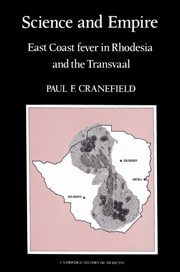Crossref Citations
This Book has been
cited by the following publications. This list is generated based on data provided by Crossref.
Pegram, R. G.
James, A. D.
Bamhare, C.
Dolan, T. T.
Hove, T.
Kanhai, G. K.
and
Latif, A. A.
1996.
Effects of immunisation againstTheileria parva on beef cattle productivity and economics of control options.
Tropical Animal Health and Production,
Vol. 28,
Issue. 1,
p.
99.
Haynes, Douglas Melvin
1999.
The Social Production of Metropolitan Expertise in Tropical Diseases: The Imperial State, Colonial Service and the Tropical Diseases Research Fund.
Science, Technology and Society,
Vol. 4,
Issue. 2,
p.
205.
MacKinnon, Aran S.
1999.
The Persistence of the Cattle Economy in Zululand, South Africa, 1900–50.
Canadian Journal of African Studies / Revue canadienne des études africaines,
Vol. 33,
Issue. 1,
p.
98.
Gradmann, Christoph
2001.
Encyclopedia of Life Sciences.
Bastos, Cristiana
2001.
Doctors for the empire: The medical school of Goa and its narratives.
Identities,
Vol. 8,
Issue. 4,
p.
517.
Echenberg, Myron
2001.
Agency and Action in Colonial Africa.
p.
34.
Phillips, Howard
2004.
AIDS and South Africa.
p.
31.
Hughes, Lotte
2006.
Moving the Maasai.
p.
23.
IVAN MORRISON, W.
2009.
Progress towards understanding the immunobiology ofTheileriaparasites.
Parasitology,
Vol. 136,
Issue. 12,
p.
1415.
Brown, Karen
2011.
Rabid Epidemiologies: The Emergence and Resurgence of Rabies in Twentieth Century South Africa.
Journal of the History of Biology,
Vol. 44,
Issue. 1,
p.
81.
WALKER, ALAN R.
2011.
Eradication and control of livestock ticks: biological, economic and social perspectives.
Parasitology,
Vol. 138,
Issue. 8,
p.
945.
Spinage, Clive A.
2012.
African Ecology.
p.
1367.
Mseba, Admire
2016.
Law, expertise, and settler conflicts over land in early colonial Zimbabwe, 1890–1923.
Environment and Planning A: Economy and Space,
Vol. 48,
Issue. 4,
p.
665.
Woods, Abigail
2018.
Animals and the Shaping of Modern Medicine.
p.
71.
Mutavi, Faith
Aarts, Noelle
Van Paassen, Annemarie
Heitkönig, Ignas
and
Wieland, Barbara
2018.
Techne meets Metis: Knowledge and practices for tick control in Laikipia County, Kenya.
NJAS: Wageningen Journal of Life Sciences,
Vol. 86-87,
Issue. 1,
p.
136.
2019.
Europa und die Schlafkrankheit.
p.
329.
Horn, André C.
and
Ramudzuli, Marubini R.
2020.
Arsenic Water Resources Contamination.
p.
157.
Gargallo, Eduard
2022.
‘Experts’, Settlers and Africans: The Production of Local Agricultural and Veterinary Knowledge in Southern Rhodesia (1897–1914).
The Journal of Imperial and Commonwealth History,
Vol. 50,
Issue. 4,
p.
639.
Silva, Matheus Alves Duarte da
and
Goodman, Jordan
2024.
Of rats and children: plague, malaria, and the early history of disease reservoirs (1898–1930).
History and Philosophy of the Life Sciences,
Vol. 46,
Issue. 4,



